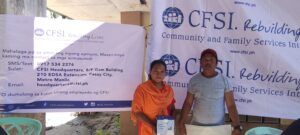“Hindi ko na po problema ang bahay namin na nasira. Wala na po yun. Nagsisimula na po ako ng bago.” – Brando, father and survivor of STS Paeng from Matuber, Datu Blah Sinsuat (DBS), Maguindanao del Norte
Brando carried two of his children and guided his family to safety as he watched what he thought was floodwaters sweep through his house and motorcycle. As each step required more effort, it wasn’t long until he realized it wasn’t water – it was mud that he was wading through. He removed his pants to maximize his movement and strength – he had to ensure he gets his family to safety. It was the only thing that mattered.
A few hours into the storm, Brando, barely clothed, brought his wife and all of their eight children to higher ground. They were all soaked, cold and tired, but safe. Brando, barely clothed, was the only one who neither felt tired nor cold. He stayed up until sunrise, his eyes glued on the nearby mountains hoping there would not be another landslide or flashflood.

Brando, Rose, and two of their children in front of their new home made from the rubble from STS Paeng.
The destruction that Severe Tropical Storm Nalgae (local name Paeng) brought became much more of a reality at daytime. As the sun rose, all they saw were the fallen trees, rocks, mud, and sand from the mountains that covered the terrain. While Brando and his wife, Rose, were grateful that the whole family survived, they felt nudges of uncertainty as they remembered their home, motorcycle, and all the livestock and crops they knew they now lost.

Brando, in grey shirt, volunteering for relief efforts by assisting in core relief item (CRI) distribution activities.
Brando is a member of the Barangay Peace Action Team (BPAT), but most of his income came from farming. He had a corn field and in addition raised chickens, ducks, goats and hogs. After years hard at work, he was able to build a house big enough for his family, send all his school-aged children to school, and buy two motorcycles – one for himself and the other for his eldest son. On his motorcycle Brando would bring their small children to school, especially at noon when he felt it was too hot for them to walk the distance.
While Brando’s earnings met most of the family’s needs, Rose also cooked and sold food to the local community. This helped augment the family’s income and enabled Rose to have her own savings.
Just before the storm, Brando had been looking forward to the third week of November as he was preparing to harvest one hectare worth of corn – supposedly his biggest yield yet; a result of both his hard work and agricultural assistance from the government. When STS Paeng left, so did Brando, Rose, and their entire family’s sources of living and the results of their long years of hard work.
Today, Brando makes a conscious decision not to look at their losses as problems. He says there is nothing else that can be done with what his family lost. Instead, he looks forward – focused on building a new house using salvaged light materials from the rubble and the remains of what used to be their home. Each day, his family survives on food rations and other emergency assistance – all of which, at the moment, seem more than enough.

Brando, left, in a grey shirt, assists CFSI in the distribution of core relief items (CRIs) to his fellow community members
While Brando lines up for assistance, joins community efforts, and improves their shelter, Rose watches over their young children. She told CFSI of how she noticed changes in some of their children’s behavior. Her eight-year-old daughter would at times wake up in the middle of the night and shout that the water is coming. Sometimes, her other young children would want to have dinner earlier in the evening to make sure they have eaten something in case something happens. Rose understands that the catastrophic event is still fresh in her children’s minds, as it is fresh in hers. Like with her children, even slight weather disturbances now bring her discomfort, and she now starts preparing dinner in the afternoon.
Rose is thankful for the psychosocial support through games and other activities conducted by CFSI and other humanitarian agencies for children. She is happy when she sees her children enjoying these and come home smiling. She thinks the games help them keep their mind off their recent experience. As for herself, she leans on her community – with neighbors and fellow mothers, sharing each other’s experiences and thoughts. This, too, somehow lessens her anxiety.
With the help of the community, the LGU, NGOs, and other humanitarian groups, Brando, Rose, and their family are rebuilding their lives one step at a time. As Brando takes each step, he also looks ahead a little further into the future, hoping for the best when they can stand on their own again.

Rose and Brando with CRIs received from CFSI and other humanitarian partners to help them rebuild their lives.

